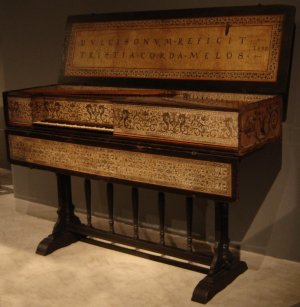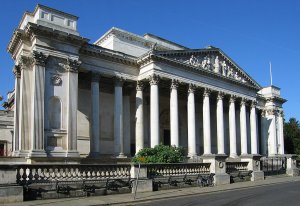
- Home
- —
- Thurston Dart
- - Objets Dart
- - Dart Biography
- - Dart Remembered
- Little Feat
- Francis Tregian
- —
- Ingestre Hall
- Time Wasters
- Personal Records
- Album Covers
- —
- Performing
- YouTube Videos
- Sessions
- Arranging
- Tuition
- Music and Theatre
- Folk Club
- Special Occasions
- —
- A Life in Music
- Memorabilia
- Employment
- Qualifications
- Odds and Sods
- Contact
Who wrote the Fitzwilliam virginal book?
Greg passed away on 25 July 2020.
Donations in his memory can be made to British Heart Foundation.
His partner, Katy, will monitor his email if anyone wants to get in touch.
The manuscript

A virginal of 1598 - photo by Gérard Janot
There is a beautiful, hand-written manuscript in the Fitzwilliam Museum in Cambridge known as the Fitzwilliam Virginal Book. It contains the largest collection of Elizabethan and Jacobean keyboard music – a "virginal" being a small harpsichord – numbering nearly three hundred pieces composed during the fifty years before the first published keyboard music in England in 1612.
It is tremendously important historically, not least for the range and variety of its pieces from a period during which musical theory and notation were going through a great transition into the modern era. For example, such things as bar lines and symbols indicating sharps and flats were being introduced. We do not know for certain who wrote it but it seems probable that the creation of this treasured document, this enormous labour of love, was the by-product of a chain of remarkable events.
Along with the rest of his collection, which is housed in the museum that bears his name, the volume was donated by Richard 7th Viscount Fitzwilliam to the University of Cambridge in 1816. He had acquired it from Robert Bremner who had bought it for ten guineas in 1762 at the sale of the collection of J. C. Pepusch (1667-1752), the German-born composer best known for his musical contribution to The Beggar’s Opera. He was a scholar with an unusual interest, for the time, in earlier music and was a co-founder of The Academy of Ancient Music in 1710. The volume’s provenance before that is unknown.
It has long been reputed to have been compiled by Francis Tregian the Younger, from Cornwall, while he was imprisoned in the Fleet prison for recusancy from about 1608 up to his death, supposed until recently to be in 1619.[1] This incarceration could possibly have given him long enough to carry out such a task but it raises a question about how he was able to cultivate the taste, knowledge and contacts in order to collect all the music for copying.
The Tregians
There had been many important Cornish musicians before Tregian. The eminent composer William Cornyshe (1469-1523), whose ancestors would have been given that surname because they had come from Cornwall, was a great composer in the time of Henry VII and Henry VIII and the most eminent of several musicians with the same name at that time. There was in fact another William Cornyshe (c.1430-c.1502), who may have been his father. It is not clear which works were by William senior and which by William junior. The composers Giles Farnaby (c.1563-1640) and his son Richard were Cornish. Thomas Tomkins (1572-1656), though born in Wales, was said to be of Cornish stock (from Lostwithiel). The compositions of these three, along with those of Byrd, Dowland, Bull, Morley, Philips and others, featured in the Virginal Book.
Tregian (pronounced Trudgian, which in that alternative spelling is also a Cornish surname) is a very interesting figure and to this day there are many mysteries about how he operated. We know much about his lineage as he was the son of a much more famous father, Francis Tregian the Elder.
Francis senior was of a rich, land-owning family. His own father had married into the Arundell family and Francis himself married a Stourton (Mary, daughter of Charles, the 8th Lord Stourton) which linked him to the Dudleys, the Howards and the Stanleys (Earls of Derby). Several manors were owned in Cornwall, including Golden, the family home in the parish of Probus. ("Golden" was a corruption of Wolvedon, sometimes spelled Volvedon, which had been the name of the branch of the family from whom it had been inherited.)[2]
The Tregians, then, were well well-connected and well off. However, in the religious and political turmoil of the Tudor era they were vulnerable because they held to the old Roman Catholic faith. The story of Francis senior’s recusancy and downfall is well documented. He harboured Cuthbert Mayne (later Saint Cuthbert Mayne, canonised in 1970), a Roman Catholic seminary priest, who had been at the English College in Douai during 1573–6, and who, in 1577, was arrested by Sir Richard Grenville (he of the Revenge and Tennyson's poem), convicted of high treason and hanged, drawn and quartered in the market square at Launceston. Francis' own death sentence was remitted to a punishment which included the confiscation by the Crown of his Cornish lands and goods and perpetual imprisonment. He was kept in the Fleet prison from about 1580 to 1601, when he was parolled to Chelsea. He finally left England in 1606 and lived in Portugal, on a pension from the King of Spain, until his death in 1608. He was buried in Lisbon, upright to symbolise his struggle for his faith against Queen Elizabeth.
Francis junior was born at Golden (in 1573 or 1574) but on the conviction of his father in 1579 his family were evicted and went to London. Francis was educated in France (at Eu, then Douai) and later worked in Rome as steward of Cardinal Allen, after whose death in 1594 Francis junior was described as "a talented and noble layman, knowledgeable in philosophy, music and Latin".[3] In 1594 he may have returned to England to attempt to reclaim his father's Cornish estates. In 1603 he was in Brussels. The earliest documented evidence of his return to England is dated December 1606.[4] He got into debt buying back Golden from the wife of George Carey, later Lord Hunsdon (the Lord Chamberlain to whom the estates had been conveyed). It seems that it was this debt, aggravated by the penalties for recusancy, which led to his being imprisoned on the orders of King James.
The conundrum

Fitzwilliam Museum - photo by Andrew Dunn
Did Tregian's work whilst in prison include compiling and copying what was to become known as the Fitzwilliam Virginal Book? Did he have the time? The book is only one of four manuscripts (totalling around 2000 pieces in a wide musical range of composers and genres) which have been attributed to Francis Tregian. (The others are Egerton MS 3665 in the British Museum; New York Public library MS Drexel 4302; and some of Christ Church, Oxford, Music MSS 510-14.) Their choice of pieces reflects a broad and cultivated taste: though many Catholic composers are represented, other composers are too. [5] According to the hypothesis that Francis Tregian was in prison for about eleven years he would have had to complete copying out a piece, on average, about every two days. But how would he have been able to select and collect the music?
It now seems that he couldn't have been "inside" all that time. If it was indeed debt for which he was confined, rather than recusancy offences, he may well have been at liberty later than was thought. The date of the summons (for debt) was not until 27 July 1611 and, furthermore, there is much documentary evidence in the Courtney Library in Truro that he was regularly down in Cornwall during the period from then up to 1616, which would suggest that either the summons wasn’t carried out until after that date or that Tregian was granted time away from his jail, a practice which was allowed (for a price). So it seems Tregian had less time in prison to do the work than was thought but, on the other hand, more freedom to collect the music.
We now know that Tregian died in the Fleet in 1617,[6] and that there were "many hundred volumes" in his chamber.[7] However, no inventory has ever been found. The document of Administration arranged for his unmarried sisters Catherine and Dorothy to take care of his estate. Tregian was buried in St Bride’s Church, Fleet Street on 11th August 1617.[8]
Because of the gap in the provenance of the Fitzwilliam Virginal Book prior to the 18th century, identification of Tregian as the author has never been absolutely established, though it is generally accepted. Much study of the handwriting, paper, and so on, of the four manuscripts has left uncertainty as to how much confidence there can be in the attributions. Nevertheless, the cultivated taste of a connoisseur and a great knowledge of contemporary music both in England and on the Continent were required to make these compilations – and those qualifications were certainly possessed by Tregian. The annotations in Italian are further circumstantial evidence, as Tregian had worked in Italy. Furthermore, he had mobility and was not confined to the Fleet prison for the whole of a decade or more. This would make it probable that he had the opportunity to pursue his musical interests, while still having many hours of confinement to undertake the marathon task of copying. Let us suppose that Tregian was in and out of prison between 1611 and 1617. Could he have averaged about one piece of copying a day to complete all four manuscripts? No better rival claimant or scriptorium group has emerged to supplant him and he remains credited with the achievement of preserving the most significant body of late Elizabethan and early Jacobean music. If his father had not let Cuthbert Mayne into the house, British musical history might have been different!
1. The Grove Concise Dictionary: New Updated Edition (London, 1994).
2. M. Joyce Taylor, compiler, Historical Notes (unpublished manuscript deposited in the Cornwall Family History Society, Truro, 1984), Set 2, The Parish of Probus, page 2.
3. Ruby Reid Thompson, "Francis Tregian the Younger as Music Copyist: A Legend and an Alternative View", Music & Letters, Vol. 82, No. 1. (Feb., 2001), pp. 1-31, referring to Records of the English Catholics under the Penal Laws, ii: The Letters and Memorials of William Cardinal Allen (1532-1594), ed. Thomas Francis Knox (London, 1887), p. 376: "molto nobile, di 20 anni, secolare di ingenio felicissimo, dotto in filosofia, in musica, et nella lingua latina".
4. Royal Institution of Cornwall: HC/3/9 (1 December 1606).
5. In his volumes in toto Tregian’s aim may have been to preserve contemporary music of Europe most acceptable to a Catholic audience. Egerton 3665 has numerous madrigals by Italians as well as works by composers at the English court of Italian origin (the Ferraboscos and Bassanos).
6. The National Archives, PROB 6/9, 134 (1 September 1617). This information was seen by Group Captain T.P.F. Trudgian at the Public Record Office in 1984 and placed by him in the Cornwall Family History Society, Truro, in 1992.
7. Alexander Harris, The Economy Of The Fleet, ed. Augustus Jessopp, London, 1879.
Some of the music from the Fitzwilliam Virginal Book has recently been recorded by the Dutch harpsichordist Pieter-Jan Belder and a second volume is in preparation. This article has been re-published as CD notes for Fitzwilliam Virginal Book Vol. 1 by Brilliant Classics.
Images licensed under CC-BY-SA 3.0. Site Copyright Greg Holt © 2006-11